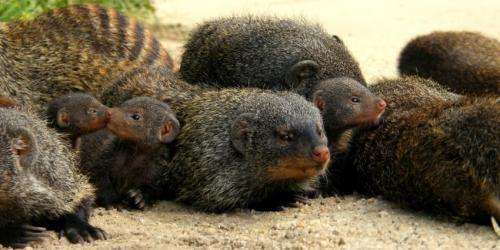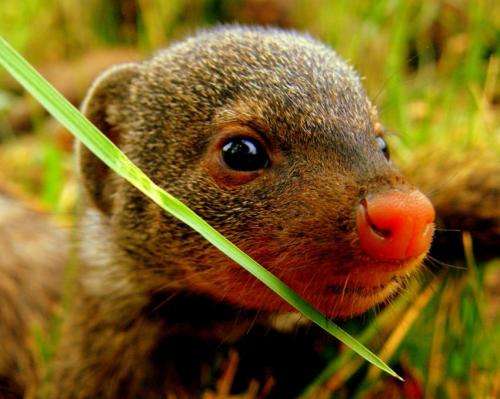Stress can make hard-working mongooses less likely to help in the future

Researchers studying banded mongooses in Uganda have discovered that those who work hard to care for pups may be less likely to invest in future offspring in the same way due to elevated stress hormones.
Dr Jennifer Sanderson, from the University of Exeter, has been observing wild banded mongooses to understand why working hard makes them less likely to work hard in the future.
She discovered that when a banded mongoose invests heavily to care for mongoose pups, it experiences an increase in circulating stress hormones (or 'glucocorticoids'), and these high stress levels inhibit similar investment in the future. The findings of the study are published today in the British Ecological Society's journal Functional Ecology.
When something you do now affects what you do in the future, scientists call it a 'carry-over effect'. Such carry-over effects are widespread in animal populations, but this NERC-funded study is the first to investigate the hormonal mechanism underlying behavioural carry-over effects.
According to Dr Sanderson: "Everybody knows that your past can affect your future, and behavioural ecologists have recently been using this phenomenon to explain why animals vary so much in how much they invest in caring for offspring. Our study has shown that carry-over effects are caused by changes to circulating glucocorticoids, or stress hormones, which is the first evidence of a physiological mechanism behind carry-over effects."
Dr Sanderson collected hundreds of faecal samples from the Ugandan mongooses which were then taken to a special Wildlife Endocrinology Lab at Chester Zoo where they were analysed for concentrations of hormones by the zoo's experts.

Dr Susan Walker, Chester Zoo's Scientific Manager added: "We've tested hundreds of mongoose faecal samples in our purpose-built endocrinology laboratory at the zoo, where we've looked specifically at levels of glucocorticoid hormones. The results from this research have shown that working hard to bring up pups in one season appears to influence the roles they will assume the following breeding season. This information is incredibly useful in ensuring we provide excellent husbandry for cooperatively breeding species in our care. Additionally, it's excellent that a zoo is able to play a key part in helping to expand our knowledge of animal behaviour in the wild."
Banded mongooses are close relatives of the famous meerkat and are found living in stable social groups across Central and Eastern Africa. They are highly social and breed cooperatively meaning that all individuals assist in offspring care even if they do not breed themselves.
The Banded Mongoose Research Project, led by Prof. Michael Cant of the University of Exeter, has been observing the mammals' investment into cooperative offspring care for over 20 years. Prof. Cant added, "If there is a carry-over effect of cooperative offspring care which is regulated by stress hormones we would expect to find 3 things: firstly that individuals with high stress levels are less likely to care for the pups, secondly that caring for pups causes stress levels to rise, and thirdly that this increase in stress continues after they have stopped caring for pups."
The results of the study confirm all of these predictions, and provide strong support for the hypothesis that carry-over effects arise because working hard to raise offspring causes increased concentrations of stress hormones, which inhibit future parental investment.
These findings provide new insight into the physiological regulatory mechanism behind carry-over effects and a better understanding of how stress associated with current behaviours can affect behaviours in the future.
More information: 'Hormonal mediation of a carry-over effect in a wild cooperative mammal' by Jennifer L. Sanderson, Andrew J. Young, Sarah J. Hodge, Solomon Kyabulima, Susan L. Walker and Michael A. Cant is published in the journal Functional Ecology.
Journal information: Functional Ecology
Provided by University of Exeter


















